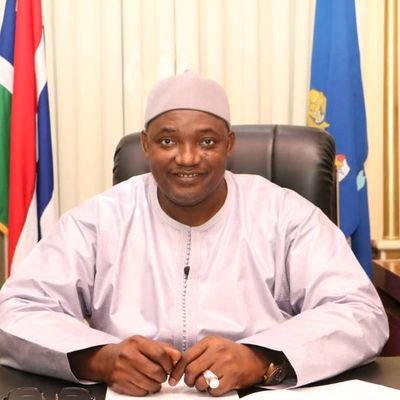OPINION
By Bakary J Janneh
In a critical juncture of the Republic of The Gambia’s political landscape, President Adama Barrow’s decision to seek re-election for the presidency stands firmly on the pillars of the nation’s democratic framework, notably the 1996 Constitution. Amidst debates and diverging opinions, it is paramount to underscore the constitutional legitimacy and the imperative of respecting democratic processes.
The Gambian Constitution, crafted with the collective aspirations of the Gambian people, enshrines the fundamental rights and duties of its citizens, including the right to seek public office. President Barrow’s candidacy aligns with this constitutional prerogative, a manifestation of the democratic ethos embedded within the nation’s governance structure.
Championing the rule of law and constitutionalism, President Barrow’s decision reflects his commitment to upholding the democratic principles that underpin the Gambian society. His candidacy symbolizes the vibrancy of democratic institutions and the resilience of the Gambian democratic experiment, forged through its people’s collective struggles and aspirations.
It is imperative to recognize that dissent and opposition are integral components of democratic discourse. However, any attempt to undermine President Barrow’s constitutionally-backed decision through means contrary to the rule of law risks destabilizing the democratic fabric of The Gambia. Such actions, devoid of constitutional legitimacy, not only erode the foundations of democracy but also pose a threat to national cohesion and stability.
In light of these considerations, it is incumbent upon all stakeholders, irrespective of political affiliations, to embrace dialogue and constructive engagement as the bedrock of democratic governance. Respect for the rule of law, adherence to constitutional provisions, and the promotion of inclusivity and pluralism are indispensable in fostering a thriving democratic culture in The Gambia.
Furthermore, labeling dissenting voices as “rebels” undermines the essence of democratic participation and stifles legitimate discourse. Instead, fostering an environment conducive to free expression and robust debate enhances the democratic vibrancy of the nation, fostering an atmosphere of mutual respect and tolerance.
As The Gambia embarks on a pivotal journey towards consolidating its democratic gains, it is paramount to rally behind the constitutional framework and uphold the principles of democracy, rule of law, and inclusive governance. President Adama Barrow’s decision to contest the presidency, rooted in constitutional legitimacy, epitomizes the essence of democratic leadership and underscores the nation’s unwavering commitment to democratic ideals.
In conclusion, let us reaffirm our collective resolve to safeguard the democratic principles enshrined in the 1996 Constitution and uphold the integrity of democratic processes. President Barrow’s candidacy, anchored in constitutional legitimacy, represents a testament to The Gambia’s enduring commitment to democratic governance and national progress. Let us stand united in our pursuit of a vibrant and inclusive democracy, where the voices of all citizens are heard and respected.




